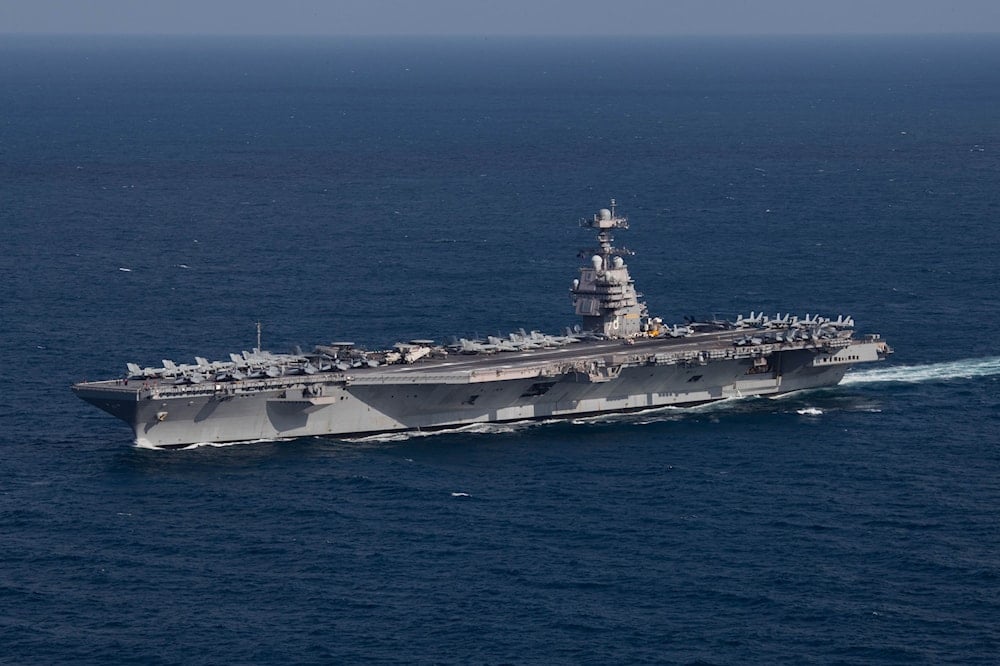US deploys carrier strike group as it continues to threaten Venezuela
The US sends the Gerald R. Ford Carrier Strike Group to the Southern Command region as tensions rise with Venezuela.
-

The US Navy aircraft carrier USS Gerald R. Ford (CVN-78) steams the Atlantic Ocean during a simulated straits transit with the Gerald R. Ford Carrier Strike Group in the Atlantic Ocean, October 9, 2022 (US Navy)
The United States has deployed the Gerald R. Ford Carrier Strike Group to the US Southern Command (SOUTHCOM) area of responsibility, the Pentagon announced on Friday, amid rising tensions with Venezuela and alleged anti-narcotics operations across the region used as a pretext to justify an illicit bombing campaign.
"In support of the President’s directive to dismantle Transnational Criminal Organizations (TCOs) and counter narco-terrorism in defense of the Homeland, the Secretary of War has directed the Gerald R. Ford Carrier Strike Group and its carrier air wing to the Southern Command," Pentagon spokesperson Sean Parnell said in a statement.
According to Parnell, the mission is to “bolster US capacity to detect, monitor, and disrupt illicit actors and activities that compromise the safety and prosperity of the United States homeland."
"These forces will enhance and augment existing capabilities to disrupt narcotics trafficking and degrade and dismantle TCOs," Parnell's statement continued.
The move marks a significant US escalation of violence in the Western Hemisphere, coinciding with continuous US threats to Caracas.
Read more: Top US commander in Latin America steps down amid growing scrutiny
Strike targets alleged Tren de Aragua vessel in Caribbean
In a separate announcement on Friday, US Secretary of War Pete Hegseth revealed that the US military conducted a night-time strike on a vessel allegedly operated by Tren de Aragua, a group designated by Washington as a terrorist organization.
“Overnight, at the direction of President Trump, the Department of War carried out a lethal kinetic strike on a vessel operated by Tren de Aragua… trafficking narcotics in the Caribbean Sea,” Hegseth said in a statement posted on social media.
The strike reportedly killed all six men aboard the vessel. Hegseth emphasized that the operation took place in international waters and confirmed that no US personnel were harmed.
"If you are a narco-terrorist smuggling drugs in our hemisphere, we will treat you like we treat Al-Qaeda. Day or NIGHT, we will map your networks, track your people, hunt you down, and kill you," Hegseth added.
Overnight, at the direction of President Trump, the Department of War carried out a lethal kinetic strike on a vessel operated by Tren de Aragua (TdA), a Designated Terrorist Organization (DTO), trafficking narcotics in the Caribbean Sea.
— Secretary of War Pete Hegseth (@SecWar) October 24, 2025
The vessel was known by our… pic.twitter.com/lVlw0FLBv4
Trump signals possible ground operation in Venezuela
The deployment and strike follow US President Donald Trump’s statement a day earlier, in which he signaled preparations for a potential ground operation against drug cartels in Venezuela.
While no direct action has yet been confirmed inside Venezuelan territory, Trump’s remarks have heightened regional concern over the possibility of escalating military involvement in Latin America.
Read more: GOP Senator tells Axios: Congress in the dark on Venezuela strikes
The US Southern Command has increasingly become a focal point in Washington’s strategy to counter transnational crime and what it calls “narco-terrorism” networks operating in Latin America and the Caribbean.
The latest deployment of the Gerald R. Ford Carrier Strike Group, the US Navy's most advanced strike group, signals a ramp-up in US operational posture just as Venezuela remains at the center of geopolitical friction between Washington and Caracas.
Regional reaction and political implications
The show of military force in the region is likely to raise alarm among South American nations. Just days earlier, Brazil warned that any US intervention in Venezuela could destabilize the continent and radicalize politics across South America.
The operations come at a time when multiple Latin American governments are calling for de-escalation, dialogue, and multilateral approaches to regional security challenges, rather than unilateral military campaigns.

 4 Min Read
4 Min Read










